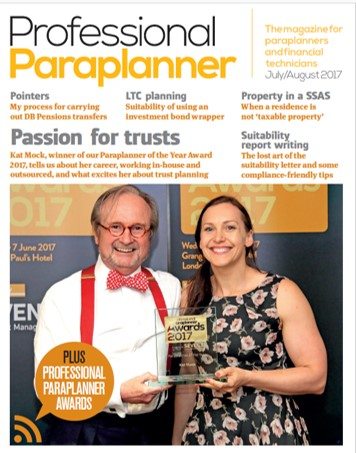Rob Kingsbury talks to Kat Mock, winner of our Paraplanner of the Year Award 2017, about her career, working in-house and outsourced, and what excites her about trust planning
In the course of her six-and-a-half-year career as a paraplanner, Kat Mock, paraplanner with The Aspire Partnership and winner of the Professional Paraplanner Paraplanner of the Year award 2017, has experienced the gamut of paraplanning roles. She has worked in-house and outsourced, for tiny companies as well as large companies, and for firms with different kinds of structures, processes, philosophies, views and personalities.
As she has progressed what has become increasingly important to her, she says, is the integrity of the job and being the best version of herself. “I feel a lot more responsibility now than I did in my 20s when all that mattered was doing a good job. Now I want to do a good job for me, for the client and my colleagues. That matters to me.
“And I couldn’t work somewhere where I didn’t feel we were doing the right thing in the right way for the client,” she says. “You have to find a place where you believe in what you’re doing. We’re giving advice to people about their life savings and you have to believe in what you are telling them to do.
“I’ve come to understand what I’m good at and what I’m not as good at and I’m not trying to be the type of paraplanner I think other people want me to be. I think when you know what’s important to you then you won’t compromise on that.”
While most people fall into a job in financial services rather than have it as an ambition, Kat says she has a film from school when she was aged 7 saying that she would like to “work in insurance like my Mummy”. In fact, her first job was at Pizza Hut where she became a manager for the company but the attraction of working Monday to Friday saw her take a financial services role, first with Aon and later with Scottish Life. She stayed in the corporate side of the industry until October 2010, when after a four-and-a-half-year stint with Zurich, she joined a small Bath-based financial advice firm as a paraplanner.
“Working at Zurich was one of my favourite jobs. I was senior relationship support manager working with a panel of IFAs, dealing with all their queries alongside a consultant,” she explains. However, a restructuring of the company’s roles acted as a cataylst for her to make a decision on how she wanted to progress. “Having been giving support to IFAs I realised I wanted to be more technical and I decided I wanted to become a paraplanner.” A recruitment consultant told her there was no way anyone would interview her for a paraplanner role because she had no experience’ (“I wouldn’t ever use that firm again,” she says) so she went out and “talked to a few people” and secured a role with a small adviser firm, Target Financial Management, where she worked for nine months.
“It was a learning curve but I took the view that if I walked like a duck and talked like a duck eventually everyone would think I’m a duck. That’s often how it is with paraplanning at the beginning, you do your best and learn from everyone around you.”
Unfortunately, Target was heading towards difficulties, so Kat moved to Towry, which she said was “a massive firm and a complete change from where I had been. But again, you end up learning so much from the people around you and the massive pool of people’s knowledge that you have to call on.”
After around 18 months with Towry, Kat took what she describes as “a big step for me”, joining Richard Allum’s outsourced company The Paraplanners. “A lot of people questioned whether moving from a large company to working at home on my own, which can be lonely and requires a lot of discipline, was the right move for me. But I soon found that I absolutely loved it. I like working with people in a team but I can quite happily be stuck in a room with a problem with no distractions until I have resolved it.”
What is key to the outsourcing role, Kat says, is knowing where to go for information and the “will to learn and better yourself”.
“You have to be able to build relationships on the phone, by email and various different ways. You also have to have good support and I know when I started I was constantly on the phone to Richard and Kim (Bendall, director at The Paraplanners) with questions. You go into that role with a bit of knowledge and you come out with a huge amount, which you are getting from everyone around you.
“It was a massive challenge but it was brilliant place to work. It was like a family and I will always see it is one of my favourite jobs.”
In which case, why did she move back to an in-house role? “This is going to sound strange,” she says, “but a major reason was that I bought my own house. In doing so I had to downsize my living space, which meant there was no longer a demarcation between my working life and my private life. So, I felt it was time to move my work life away from my home life. I also felt I needed to broaden my paraplanning experience. When you work as an outsourcer you never get to meet the client, you are building a fact find on the adviser’s knowledge of the client. Moving back in-house where I am now involved with client meetings, has given me wider experience and understanding of not only the client but where I fit in the advice process.
“That experience has been really cool. The way I approach my writing has changed and it has definitely benefitted from being involved with the client. Also, I have a far better understanding of all the challenges that the adviser faces, not least in getting the right information from clients – it’s not easy.
“It’s also making me more rounded as a paraplanner. There’s a better understanding of the gravity of what you are doing. Until you meet someone and look them in the eye you don’t have the same insight into the importance of what we do; meeting clients puts things into better context.
“What also I hadn’t really appreciated before is the practicalities of the advice recommendations. The intricacies of carrying out the advice, things like the trading, after the report is written.
“So the last year for me has been a huge learning curve.”
Kat is now one of two paraplanners at The Aspire Partnership, a firm of nine people including three financial advisers. “It’s a very well run, small firm. What I liked about it when I went for interview was that there was a big poster in the meeting room which just says, ‘It’s about you’. And it is, the whole philosophy is around the client, who they are, what makes them different as people and what’s important to the client. Everyone in the firm is very focussed not on themselves but on their clients.
“They are also very keen on having a repeatable, consistent process and I’m a process person. I like a process, I’m very organised, which is why I think I loved outsourcing so much because I had my own processes to get the work done.
“What’s also great is that everyone is kind and bends over backwards for each other. I’ve yet to see anyone be grumpy.”
Specialism
If Kat has a specialism, it is trust planning. “I don’t know everything there is to know about trust, not by a long shot, but if someone asks me a question about trusts I love to go away and find the answer. I’ve a load of trusts books on my desk and I’m always willing to help others with the subject however I can.
Her love of the subject started when she was with Zurich. “In the provider world you get so much training when things happen in the market and I was at Zurich in 2006 when all the trust changes happened, so I got huge amounts of training on them. Also, I was working with a consultant who loved a good trust, so by extension if he was unavailable, I would need to talk to his IFAs, so I quickly learned about trusts.
“It also suits the way I learn, because I find it easy to put trusts into the context of a real-life situation, more than pensions for example.”
She adds that this year she has been deliberately studying pensions “because I recognise that as an area where I need to do some more work. Specifically, I’ve been working on R08, the pensions update exam, which I’ve found really useful as a means to bring myself up-to-date on pensions.”
“So you could say my specialism is trusts, and it is one of those areas I think I will always have an interest in, even when I’m not working on it.”
Growth of paraplanning
Kat sees paraplanning as “a much bigger beast” then when she started in 2010, partly the result, she suggests, of the positive changes happening in financial planning. “What we all want to do as an industry is help clients, and paraplanners are right at the heart of that because they are always wanting to challenge and improve and do the best they can.”
The growth has also come from an increased profile and the willingness of paraplanners to get involved in the industry, she adds. “We have more paraplanners getting involved in the professional bodies and talking to the regulator about what’s happening in the industry. I think paraplanners’ involvement in the way the industry develops is only going to grow.”
Central to that, she feels, is a culture of challenge. “Having people who are prepared to speak up and debate the advice process is hugely beneficial to the client. In my view, if you can’t debate and have a constructive conversation within the firm about what you are planning to advise a client, then you need to question whether you should be advising that course of action at all. It’s so beneficial for the client to have different people’s input and draw on their views and experiences.
“I think paraplanners are core to that and we will continue to have a voice and to help to raise standards and expectations around financial planning as a whole. And I think financial planning will be better and stronger for that.”
What’s a typical day for Kat?
I get into work around 8.40am. We do our own dealing here, making trades, etc, so that’s the first thing we do in the day.
Generally we run our own days and I make Monday’s my planning and chasing day, so that I can get stuck into client cases in the rest of the week. I will work out what the rest of my week will look like, which day I’m going to look at what case and when my meetings will be and what I need to prepare for.
I view my whole job as looking after the file from start to finish, making sure everything makes sense, so I spend a lot of my time familiarising myself with cases and making sure the files add up. I try to follow the same process with every client, so making sure fact finds are up-to-date and the cashflow has been done, that file notes and meeting notes follow on from one another and when you get to the recommendation it all ties up.
I will also spend time with my advisers updating on cases, and dealing with client queries as and when they crop up.
While I tend to do less actual reports a week than I did as an outsourced paraplanner I’m involved in so much more now, including research and meeting prep, cashflow, dealing and so on. Also, as we’re a small firm we all tend to help out so you get involved in everything at some point.
To break up the day, I go to the gym at lunchtime or straight after work. I train a lot and I love it.




























